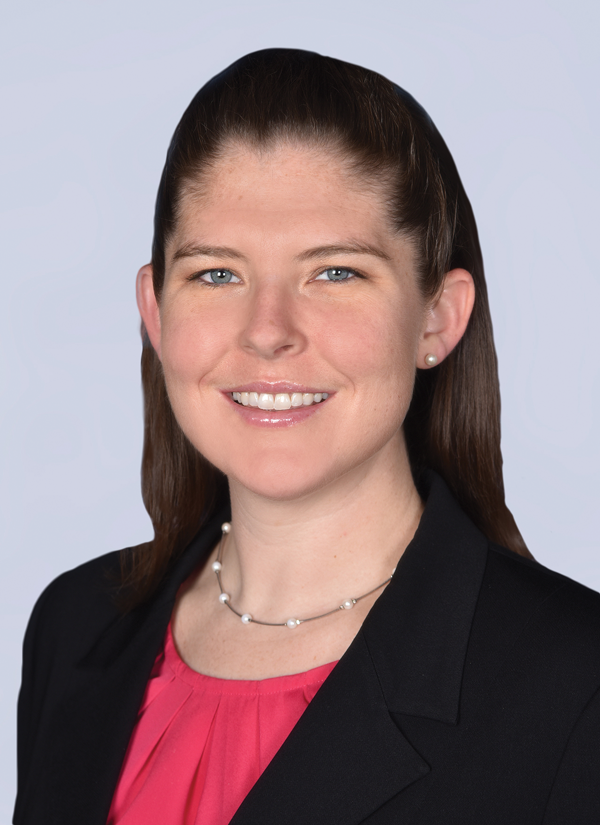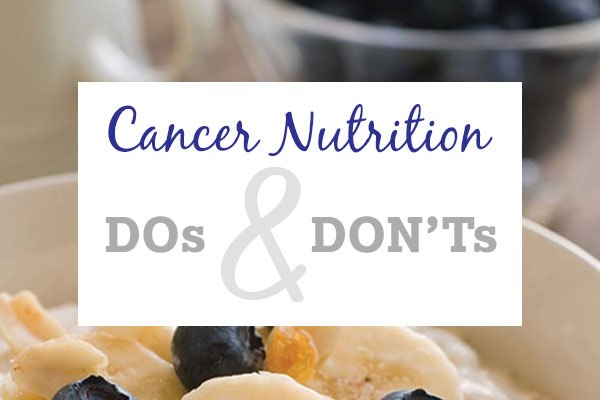Nutrition DOs and DON’Ts for Cancer Survivors
by Lauren Fay, RD, CSO, CNSC
Good nutrition is essential for cancer survivors, especially during cancer treatment and recovery. A healthy diet can help you feel better, keep your strength up, maintain a healthy body weight, manage treatment- related side effects, and even recover more quickly. Here are some nutritional do’s and don’ts that can help you make smart nutrition decisions as you navigate the cancer journey.
DO understand that nutrition priorities can change throughout cancer treatment, recovery, and survivorship. At times, adjusting your meal pattern is necessary to help keep you healthiest. For example, unintentional weight loss during cancer treatment can negatively affect your treatment tolerance, fatigue level, and recovery time. It is critical that you consume adequate calories and protein to prevent unintentional weight loss. Certain treatment side effects, like loss of appetite and early satiety, can make this challenging. Eating small, more frequent meals – and adding high-calorie, high-protein foods and beverages to your diet – can help prevent weight loss during treatment.
DON’T believe everything you hear and read. There are many well intentioned individuals and resources that offer nutritional advice to people with cancer. Unfortunately, however, these recommendations are not always research based, or they may not be a correct interpretation of the research. It’s important that you get your nutrition advice from reliable resources. The American Institute for Cancer Research (aicr.org) is one of the best resources for comprehensive, evidence-based information on nutrition and cancer. The AICR does an excellent job of translating complex research regarding nutrition and cancer into clear, understandable terms for cancer survivors, caregivers, and other clinicians. A registered dietitian nutritionist who is certified in oncology nutrition can also give you individualized evidence-based nutritional guidance and can answer any nutrition-related questions you may have.
DO ask for and accept help. During cancer treatment and recovery, it is common to experience fatigue and other limitations that may inhibit your ability to easily obtain and prepare meals. Let your treatment team, caregivers, family, and friends know if you need help with meal prep, buying groceries, or cooking. In addition, a variety of programs are available that can assist with meal delivery to your home. Your nutritionist or social worker can connect you with programs in your area.
DON’T implement any major diet changes or take any supplements without first discussing them with your treatment team. There’s a lot of misinformation out there about diets, macronutrients, vitamins, minerals, herbal supplements, and what foods cancer survivors should and shouldn’t eat. Altering your diet during treatment and recovery without guidance from your healthcare provider can prevent you from getting all the nutrients you need to support your health. Moreover, vitamins, minerals, and herbal supplements that are not recommended to you by your treatment team can interfere with the effectiveness of your cancer treatment. Some may even increase your risk for other cancers, diseases, and health conditions. It is imperative that you talk with your treatment team about any diet changes or supplements you are considering before introducing them into your diet.
DO seek advice from nutrition experts. Registered dietitian nutritionists are board-certified food and nutrition experts who are required to complete, at minimum, a four-year college degree program, as well as participate in ongoing continuing education. RDNs are also held to a professional code of ethics. When seeking nutrition advice, be cautious about individuals who identify themselves as nutrition professionals without the RDN credential, as their education, training, and professional liability may vary greatly. Moreover, they may give you nutrition information and guidance that is not evidence-based or not a correct interpretation of evidence.
Getting good nutrition during cancer treatment and recovery can sometimes be difficult. These nutrition do’s and don’ts can help you get the nutrition you need to support your health during cancer treatment, recovery, and beyond.

Lauren Fay is an oncology registered dietitian at the Inova Schar Cancer Institute and Inova Life with Cancer in Northern Virginia. She is board certified in oncology nutrition, as well as nutrition support, and is currently working toward her master’s degree in public health, with a focus on health policy, from George Mason University.
To find a registered dietitian nutritionist in your area, visit the Academy of Nutrition and Dietetics website, eatright.org, and click on “Find and Expert” in the upper righthand corner. This will allow you to search by zip code and specialty to find an RD close to you. You can identify dietitians who are certified specialists in oncology nutrition by looking for a CSO credential.
This article was published in Coping® with Cancer magazine, September/October 2020.


